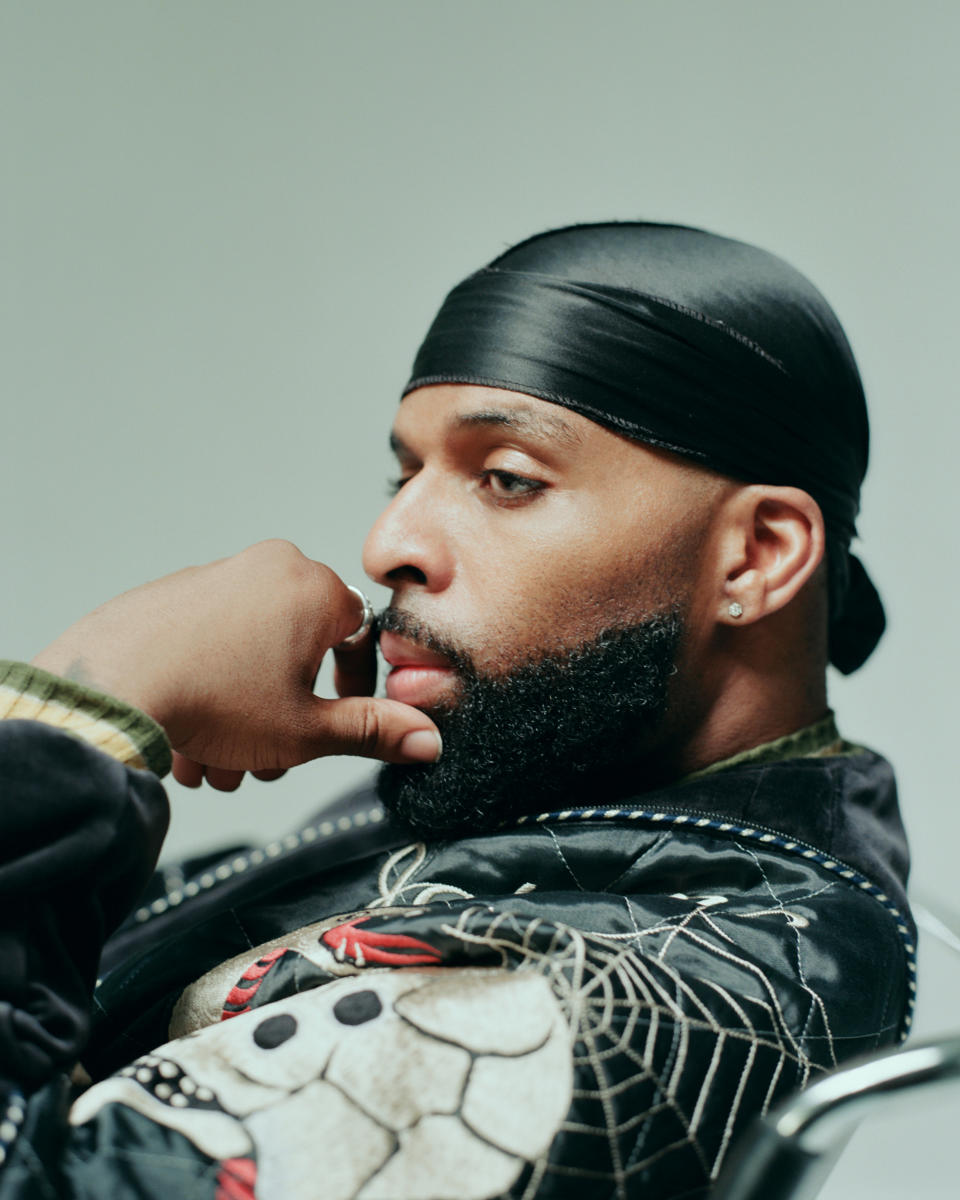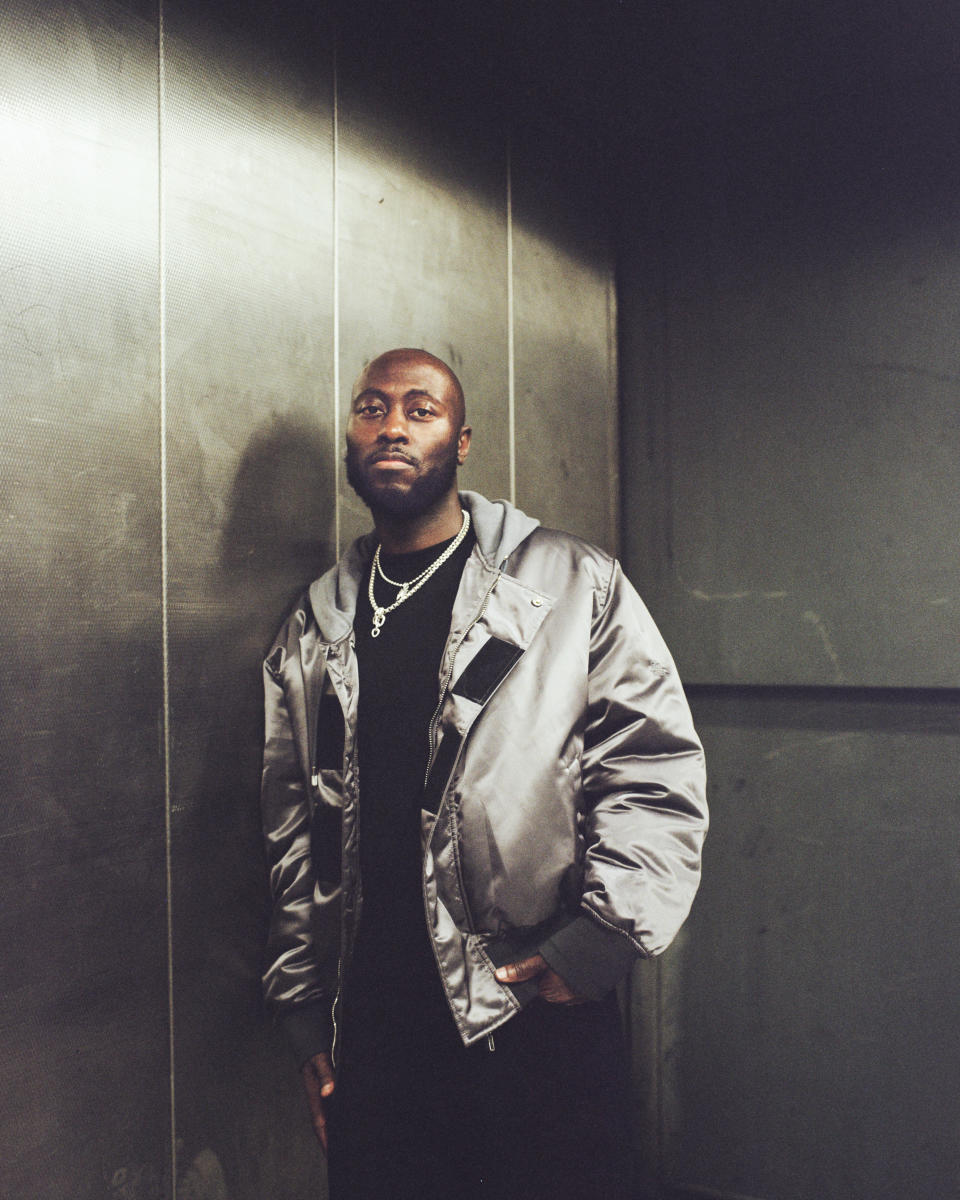DVSN Opts For Honesty Over Toxicity With ‘Working On My Karma’

DVSN is not the toxic duo you think they are. Singer Daniel Daley and producer Nineteen85 are just flawed, brutally candid men, known for translating their pensive emotional expression into musical success.
The Toronto-bred duo is “true to this, not new to this” when it comes to toxic R&B; many discovered them in 2015, thanks to an amorous ballad titled “Too Deep.” Despite the notorious reputation, Nineteen85 admitted that DVSN’s controversial “If I Get Caught” single was only part of the story. “I think a lot of people thought we started at the climax, [but] it’s been kind of a backwards reveal of how things are,” he shared with VIBE during a spirited Zoom call.
More from VIBE.com
Christmas Comes Early With New Music From Rihanna, SZA, dvsn, And More
It's A War On Toxic R&B From dvsn, Jagged Edge, The Isley Brothers And Others This New Music Friday
Though they positioned the “polarizingly honest” single, “If I Get Caught” as a successor to toxic anthems like Usher’s “Confessions Part II,” Drake’s “Marvin’s Room,” SZA’s “The Weekend,” and Xscape’s “My Little Secret,” continuing that legacy wasn’t part of the plan.
The burning question is whether or not the toxicity is deliberate on their new album, Working On My Karma. Nineteen85 admits he and his musical partner leaned into that energy because R&B is celebrating it “more than ever,” but Daley refutes the notion. “It’s not that, but I would definitely say we try to, in DVSN fashion, try to keep it very, very real. Make it something that people can actually feel nowadays. It’s like the digital world is kind of numbing us.”
As VIBE went deeper with DVSN about their latest project, the duo defined toxic R&B, shared the story behind the most honest record on the LP, and what working on their karma looks like.
How would you define toxic R&B for yourselves?
Daniel Daley: To be honest, I don’t know. I think I have a little bit of a different perspective on it because I dive into words a lot as a writer. But toxic, to me, is things that are meant to hurt. Toxins are [poisonous]. It’s things that are supposed to take people down, destroy things. I don’t resonate with that term at all because none of the music that we create is for that purpose. We try to put forth, like 85 said, just real honesty and real transparency. Sometimes it involves the ugliness of the truth. I think as long as you’re acknowledging that and approaching it from a standpoint of this is me trying to do something positive by being this real about what I am, what I’ve been through, whatever it might be. What I think is actually toxic is when people are filling their music with lies.
Speaking of honesty, you had once said you can’t give “beggin’ R&B” without showing the mistakes that led to that point. Is that how we got the very personal “Daniel’s Interlude” and what’s the story behind that?
Daniel Daley: To be honest, what I was thinking about when I said that comment, I was thinking more about ‘What’s Up.’ Because I knew ‘What’s Up’ had that classic traditional R&B sound, but [with] the interlude, I was like, let me just give you guys some of the things that have shaped my perspective. It hasn’t always been peachy. I started off in a space where I was very much a hopeless romantic in the sense of being just wide-eyed and open hearted, hoping to just put my best foot forward with things. And then life will do a number on you and until you can acknowledge that, you’ll never really fully be able to work out your karma.

Would you say that “Daniel’s Interlude” is a message to someone, directly?
Daniel Daley: The first verse is the first person I ever fell in love with. One of my first real relationships. Wasn’t a message to her [directly] because I’m past that, but it was me explaining what it was like to give somebody your all and them pull [a certain] level of betrayal. I talked about why it might be hard for me to open up and to trust sometimes. When I talked about my mom, I talked about my relationship with her husband at the time. The issues that come with putting all of your faith and trust into someone and then them letting you down. It can kind of shape how you start to look at things. So, it was more of a message to everybody like “this might be part of the reason that I might come off hard to love.”
What has your musical trajectory actually been over the past six years from SEPT 5TH to Working On My Karma?
Daniel Daley: I think we are a group that makes sure we’re making moments, but also just tries to keep progressing the conversation of R&B. At the time that SEPT 5TH came out, there was nothing like it, right? Sonically, writing, vocally—it was kind of a new thing. That’s still the idea that we have for what we’re doing right now. Because even though there are some differences in the sound, it’s the ideology of DVSN that’s still here, which is always being cool with being separate from the pack, being unapologetically on your own wave, in your own vibe. And I don’t think there’s anything like this album that’s going on in R&B or that’s going to come from R&B right now [from] any other male R&B singer or group. This is us trying to help reset the systems, refresh the palette, bring some more traditional R&B to the forefront as far as the sound, but then also still progress it with the writing and the topics and being very real about where we are today in the relationship in society and the human experience.
There’s still ample amounts of slow jams. Oftentimes in a toxic relationship, sex is used as a cop out from actual communication. Were those tracks intended to distract listeners from the overall story being told?
Nineteen85: Distract? No. I think that’s part of the experience. You’re always going through the ups and downs, whether you’re love making, arguing, cheating. I think those are all just natural parts of the process that aren’t often talked about in one setting. People tend to be like, this is an album of bedroom music, or this is an album of turn up records, but they don’t have them all in the space of, if you’re to follow this guy’s journey or to follow him during the path of meeting a girl to wherever it ends up. I think these are all the things that happen between those times.

What would you say is the biggest takeaway from the album?
Daniel Daley: Working on the karma. Aren’t we all? It’s the beginning stages of somebody taking a look at themselves and being like, ‘ ‘Hey, you know what? This probably wasn’t the right thing to do.’ It starts at meeting someone new and being able to talk to somebody, to starting the relationship—which a lot of times starts off sexual nowadays—with songs like “Bring It.” Then all of a sudden, things are getting more serious and you guys are having to address where you’re at. “Making Mistakes,” “If I Get Caught,” and “What’s Up.” Then figuring things out, taking a hard look at yourself, with “Don’t Take Your Love,” to “[Daniel’s] Interlude,” and all the stages kind of shows how it can come back around with something like “Get Even.”
It’s kind of the idea that you’ve got to be careful with what you put out there, because these things come around and find you sometimes when you don’t want them to. I think you have to start realizing that you can only get from life what you put out and what you put into it. However you want to take that, whatever it is that you do. If that’s just a work ethic thing, if that’s a relationship thing, if that’s a profession thing, if that’s morally, hopefully we’re all working on getting it right.
So my final question would be, how exactly are y’all working on your karma?
Nineteen85: I think you’re hearing it on record with us. We’re very unfortunately aware of a lot of our missteps and struggles, relationship-wise and personally. And I think the biggest thing is it’s really hard to admit you have work to do. That’s the hard part. If you can get to the point where you’re like, ‘You know what? I’ve got to work on some things,’ then you’ll normally be alright. But most people can’t. You can’t get to that space. It’s really difficult to really admit, ‘Yeah. You know what? Let me take some time to figure out what’s going on with me and then I can figure out what’s going on with us.’
Yeah, for sure.
Daniel Daley: Yeah, definitely. The acknowledgment of it is the start. You don’t have to get it right. You just got to at least get to a place where you realize that there’s something to do. You’re going to have to figure out. Because this project doesn’t end off with me figuring it out. You’re still in it. And I think it’s a never-ending journey, a never-ending process to try to be better than you were yesterday. So wherever that takes you, if that takes you to the church, takes you to your own subconscious, if it takes you to calling that family member you’re not talking to anymore, or telling someone you’re not ready to be in a relationship instead of dragging them along. Whatever it might be. Yeah, hopefully it leads you to that. I hope that part of our work is done just by putting that concept out into the world of working on your karma. I hope that part of our redemption comes from sparking that type of mentality in our generation.
DVSN’s Working On My Karma is now streaming on all digital platforms and catch the duo on tour in 2023.
Best of VIBE.com

